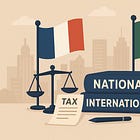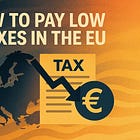How to pay low taxes in the Americas, Africa and Asia
Tropical beaches, thriving cities and low taxes
Note : This article is the 5th in a series on how to significantly reduce your tax bill and maximize your freedom by moving abroad. Here are the first articles in the series :

Americas
Costa Rica
This beautiful and very popular country has a territorial tax system, like many other countries in the Americas.
This means that any income generated outside the country is not taxed.

Many expat entrepreneurs with an online business set up an LLC (limited liability company) in the USA to take advantage of this, even though, in theory, this creates a taxable permanent establishment in Costa Rica (more on this in an upcoming article).
However, the local authorities don't seem to be interested in these cases, probably because they are well aware that many of these entrepreneurs would simply go elsewhere.
Panama

Costa Rica's neighbor, with its sulfurous reputation, also has a territorial tax system, and the same type of organization with an American LLC is possible there.
The country also boasts magnificent landscapes and, unlike Costa Rica, its capital is modern and surprisingly friendly: I was pleasantly surprised the first time I went there, seeing it as a kind of Miami in miniature, with more charm.
Nicaragua

Costa Rica's neighbor offers the same advantages as Nicaragua and Panama.
Paraguay

This landlocked country wedged between Brazil, Argentina and Bolivia isn't the best known in the world, but it's used quite frequently by digital nomads to set up a legal and tax "paper residence" that allows them to be officially resident somewhere while they roam the world.
This is due to the relative ease of obtaining permanent residency, which only requires a visit to the country every three years. It's also very easy to obtain a tax number.
Coupled with the possibility of renting an apartment very cheaply in order to have water and electricity bills, this enables digital nomads who need it to open accounts with banks, brokers, etc., many of whom still ask for this obsolete information. - many of whom still require this obsolete information to open an account. Some digital nomads also simply pay the electricity or water bill of a friend somewhere.
Africa
Mauritius

This tropical island paradise, well known to French speakers, offers not only picture-postcard scenery, but also highly advantageous tax conditions: a corporate tax rate of 15%, an income tax rate of 20% maximum, and no tax on capital gains.
What's more, the island has a territorial tax system, and any income generated outside the island is taxed only if it is brought back to the island.
Asia & Middle East
Dubai
Aaaah, Dubai. If there's one city that elicits fiery, contrasting reactions, it's this one.
Quite simply, I've never seen a place about which people talk so much nonsense and accumulate so many clichés.
And I can understand why: even before I went there, I had a lot of preconceived ideas about the city. In fact, the first time I went there, it was almost under duress: my partner's best friend at the time was getting married there, and she absolutely wanted us to go.
I remember my reaction: "Dubai? What's there? There's nothing there! What's the point of going there?"
So I forced myself to please her... and I found myself loving the city.
I'd been living in London for just under three years, and as a digital nomad, I was ready to move elsewhere: I wondered what my next country of residence would be.
Dubai having piqued my curiosity, I took advantage of a trip to Asia to stop off there for a few days1 on the way there and on the way back, to explore the city a little more.
This convinced me, and in mid-2018, I decided to move there.
But you already know that: now that your memory is refreshed, I'm not going to repeat everything I wrote in this article about what made me decide to settle here.
Just remember that I've been living here for a while, so I know a lot about the city and what it has to offer.
Given all the preconceived ideas about the city, and the experience I've gained here, I invite you to take a dip into this city-state to dispel the most common myths.
After all, the overwhelming majority of criticism comes from people who have never set foot in the city or, in the best case scenario, have spent ten days there and, as soon as they get back on the plane, take great pleasure in criticizing everything that moves.
In particular, we'll see that Dubai is an excellent example of a state that has perfectly understood its place in the modern world and its position in the jurisdictional market, which is to offer governance services at unbeatable value for money.
Coming Soon :
In the next article, we’ll challenge the most persistent myths about Dubai — from oil wealth and women's rights to religion, business, and even nature. `
Is Dubai really built only on oil? Are women oppressed? Do you need a local sponsor to launch a business? Is it a soulless concrete jungle?
We’ll unpack these clichés one by one and reveal the surprising truths behind one of the most misunderstood cities in the world.
Stay tuned ! In the meantime, feel free to follow Disruptive Horizons on X/Twitter & Linkedin, and join the tribe of Intelligent Rebels by subscribing to the newsletter :
And here are the first articles of this series :
As Dubai is located right between Asia and Europe, stopping off there for a few days is an excellent way to cut your jet lag in half: instead of having to endure a 6-hour time difference on your way to Thailand, for example, you can spend three days in Dubai, enjoying the city while recovering from the 3-hour time difference, then head back to Thailand.







